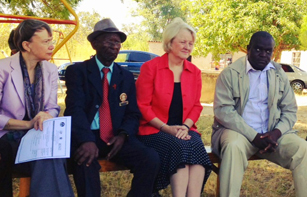
Feature Story
Zimbabwe’s sustained progress towards “Getting to Zero”
14 May 2013
14 May 2013 14 May 2013
L to R: UNAIDS Country Coordinator Tatiana Shoumilina, Chief Chiveso, traditional leader, Ms Beagle, and Provincial Governor Martin Dinha, in the area of Bindura, Zimbabwe. Credit: UNAIDS
Zimbabwe is an example of political commitment and progress in the AIDS response. Although it is one of the countries most affected by the HIV epidemic in sub-Saharan Africa, with an adult HIV prevalence of 15%, the country has achieved and sustains universal coverage of treatment to prevent mother-to-child-transmission of HIV (93%) and adult antiretroviral therapy (ART) with 95% of adult Zimbabweans eligible for HIV treatment receiving it.
This scale up of comprehensive HIV prevention, treatment, care and support services in the country has resulted in the decline in the rate of new HIV infections from a peak of 5.21% in 1994 to 0.86% in 2012.
Zimbabwe’s progress in the AIDS response is largely credited to the country’s capacity to mobilize and sustain domestic resources for the response through its innovative AIDS levy—a 3% tax on all taxable individual and institutional income. In 2012 alone, the levy generated US$ 32 million. Zimbabwe also successfully mobilized US$ 311 million from the Global Fund to Fight AIDS, TB and Malaria under its new funding model. A further US$ 244 million, from Zimbabwe’s quality request, is pending the outcome of the upcoming Global Fund replenishment.
The communities are doing exemplary work, addressing issues related to gender equality and the empowerment of women, using community dialogue and facilitating community actions and solutions.
Ms Jan Beagle, UNAIDS Deputy Executive Director, Management and Governance
In early May 2013, UNAIDS Deputy Executive Director, Management and Governance, Jan Beagle, undertook a country visit to Zimbabwe to witness the progress made. She also looked at challenges ahead in achieving the targets of the 2011 General Assembly Political Declaration on HIV and AIDS and discussed the role of Zimbabwe, as a new member to the UNAIDS Programme Coordinating Board this year, in the governance of UNAIDS and the AIDS response.
During a meeting with the Vice President Hon Joice Mujuru, Ms Beagle commended the Government of Zimbabwe for its leadership in the AIDS response and encouraged the country to scale-up paediatric ART coverage, which by end of 2012 remained at 42%, and to accelerate efforts to reduce maternal mortality.
Communities leading the way
Ms Beagle travelled to Bindura, a rural area located about 90 km north-east of the country’s capital Harare, where she talked to community representatives, traditional leaders, local service providers, and district and provincial administrators. With support from the non-governmental organization PADARE, a movement of men advocating for gender justice, the community champions male involvement in preventing new HIV infections among children and increasing uptake of HIV prevention and treatment services. It also focuses on strengthening sexual and reproductive health services for young people, especially girls, and addressing gender-based violence.
PADARE concentrates on men in all settings and uses communication and networking tools, workshops and training, lobbying and advocacy to achieve social and behaviour change. The organization works through 65 chapters and has a membership of more than 3 000 in the country’s ten provinces.
“The communities are doing exemplary work, addressing issues related to gender equality and the empowerment of women, using community dialogue and facilitating community actions and solutions,” said Ms Beagle. She urged the communities to ensure that the needs of populations at higher risk of HIV infection—such as women, young people, people with disabilities, sex workers and men who have sex with men—are recognized and appropriately met.
NOTE: As part of her official programme in Zimbabwe, Ms Beagle also met Hon Dr H. Madzorera, Minister of Health and Child Welfare; Hon Dr O. Muchena, Minister of Women Affairs, Gender and Community Development; Hon Dr D. Parirenyatwa, Chair, Parliamentary Portfolio Committee on Health; leadership of the National AIDS Council; members of the Country Coordinating Mechanism; members of the Executive Committee of the Zimbabwe Parliamentarians against HIV network; and the Steering Committee of Zimbabwe GlobalPOWER Chapter. She also interacted with civil society representatives and young people, and engaged with the UN Resident Coordinator and the UN Country Team. She visited the Beatrice Road Infectious Disease Hospital, a public health care organization providing adult and paediatric Opportunistic Infections and ART services.



